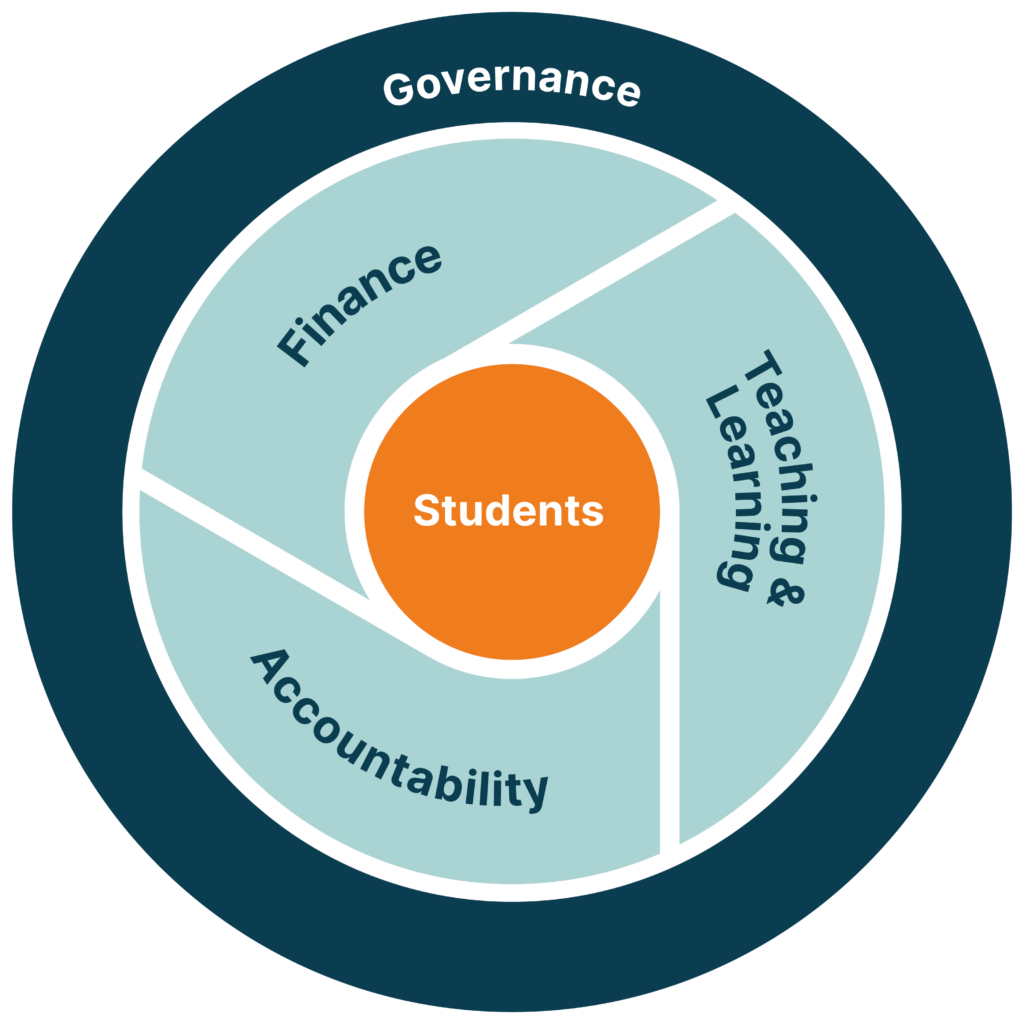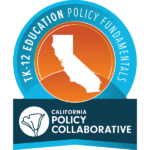TK-12 Education Policy program
For impactful learning, this program pairs a flexibly paced e-learning course on the fundamentals of California’s TK-12 policy framework with in-person convenings that complement and reinforce the online coursework.
The Road Ahead
Independent Study

Course participants will have access to an online course consisting of five learning sections using the LearnDash Learning Management System (LMS).
In preparation for each section’s corresponding in-person convenings, participants will have the flexibility to determine when they access the course content using the LMS.
The course sections are intended to build foundational California TK-12 policy knowledge and support related skill development.
The five sections of the course include:
Delve into the diversity of California’s student population, demographic trends and student outcomes – including information on the impact of the COVID-19 pandemic – and the implications of this data for understanding and planning effective policy.
Learning Objectives for this Section
To develop:
- A clear understanding of California’s historic, current, and future child demographic trends, as well as what the implications of those trends are for public education and, by extension, for California’s economy, society, and democracy
- An understanding of student outcomes in California, including variations over time, across subgroups, and in comparison, to students’ outcomes in other states
- The ability to analyze student outcome data, across multiple measures, and use tools and resources to learn more and apply this capacity to achieve your legislative objectives
Learn how the state has approached its role and responsibilities regarding public education over time, including setting expectations for the education students receive and allocating authority to support meeting those expectations.
Learning Objectives for this Section
To develop:
- An understanding of the main entities that have a role in governing California schools
- An understanding of the federal and state laws, court decisions and California initiatives that have influenced local school policy and practices over time
- The ability to leverage an understanding of the historic and current federal, state and local relationships in education into effective state policymaking
- An awareness of the critical skills necessary for effectively staffing a TK-12 bill to maximize the likelihood of success, including developing key materials, communicating with committee staff and understanding applicable deadlines
Learn how public schools are financed and some of the driving factors that have led to the overall amount invested and how funding is distributed among local education agencies – and within them.
Learning Objectives for this Section
To develop:
- An understanding of the mechanisms that drive the state’s overarching investment in TK-12 public schools
- A working knowledge of how school funding is distributed by the state, including the Local Control Funding Formula and the special education funding formulas
- An understanding of the key mechanisms for funding school facilities
- An awareness of recent state budget issues and decisions and their impact on local education agency budgeting practices
- An ability to leverage your understanding of these funding dynamics as you pursue education priorities, including navigating the budget process
Investigate the state’s role in teaching and learning, including the connection between content standards, curriculum frameworks, assessment, teacher credentialing and training.
Learning Objectives for this Section
To develop:
- An awareness of the growing body of research on how human beings learn and the connection to TK-12 public education in California.
- An understanding of California’s content standards, curriculum frameworks, instructional materials, assessment systems, teacher credentialing standards, teacher preparation pathways and the Statewide System of Support – and the link between them.
- An ability to identify and articulate the balance between state and local responsibilities regarding teaching and learning – and the role effective state policy making plays.
Explore the multiple mechanisms the state uses to promote accountability, including those that shape inputs, processes and desired outcomes.
Learning Objectives for this Section
To develop:
- An understanding of the historical context and vision behind California’s existing approach to education accountability
- A working knowledge of the state-adopted California School Dashboard, Local Control Accountability Plan (LCAP) template and the Statewide System of Support
- The ability to apply this knowledge of state education accountability policy levers to effective state policymaking
Social Events
These convenings will provide an opportunity to meet with other cohort participants and senior staff in the Legislature to build relationships and further explore the concepts and issues introduced in the course curriculum. These events are organized to support relationship-building and open lines of inquiry.
Engagement with Experts
Interactive, inquiry-based activities and meetings with leading experts in the field, including fellow policy staff, researchers, practitioners and community stakeholders will create space to examine relevant data and practice in concert with policy expertise and the communities most affected by the policy decisions being made.
Participant Eligibility
Legislative Staff
Legislative staff working in the Capitol, particularly those who staff members on TK-12 education policy.
Passionate About TK-12 Education
Staff passionate about shaping Transitional Kindergarten-through-12th-grade education policy for future generations in California.
Hybrid Learning: Can Participate Three Days a Month for Three Months
Those who can participate three days a month in hybrid learning for three months during the legislative recess (between October – December)
Continuing Education Units
Those who are interested in receiving eight continuing education units (CEUs) from the University of California, Davis, for completion of the course.
Program Schedule
October 2024 to December 2024
This course was structured with the busy schedule of legislative staff in mind and will respect the legislative calendar. All events will be offered during the fall recess.
Participants will be required to dedicate time three days each month for the three-month hybrid program. Each month will include:
1 Day
Independent Study
2 Days
Engagement with Experts
½ Day
Social Events with Peers and Colleagues (Voluntary)
Continuing Education Units

Learning Community members who complete all the coursework offered in the online Learning Management System and Attends The In-Person Convenings will be eligible to receive eight continuing education units (CEUs) through the University of California, Davis.
Along with the CEUs transcript, a digital badge – which is graphic verification of the skills you have mastered and verifies your competencies digitally – will be made available. A digital badge is a great way to share your accomplishment with family, friends and colleagues via social platforms such as LinkedIn, Facebook and Twitter.
Already Enrolled in a Course?
If you are already enrolled in a course, you can login using the link below to resume learning.
